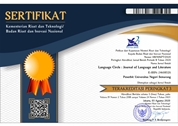The Rendering of Ideology in the English-Indonesian Translation of Brontё‟s Jane Eyre
(1) Universitas Negeri Semarang, Indonesia
(2) Universitas Negeri Semarang, Indonesia
(3) Universitas Negeri Semarang, Indonesia
Abstract
This study deals with the rendering of ideology found in the English-Indonesian translation of Brontё‘s Jane Eyre. The main objective of this study is to investigate the rendering ideology in Brontё‘s Jane Eyre from English into Indonesian which is realized in the vocabulary and grammar choices used by the translator in translating ideology in Jane Eyre from English into Indonesian. It used descriptive qualitative approach. Moreover, Critical Discourse Analysis (CDA) proposed by Fairclough (1989) is used as the framework of the study. The data obtained were taken from ‗Jane Eyre‘ by Charlotte Brontё and it is translated by Lulu Wijaya entitled Jane Eyre. The unit of analysis of the study was ideological content including word, phrase, clause, sentence, and paragraph contained in Jane Eyre and its translation.The results showed that there are 120 ideologically loaded-data which is categorized into Ideology. They are ideology as tacit assumptions, beliefs and value systems. Meanwhile, there are 32 (27%) data which are not lexically equivalent in the Indonesian translation. Thus, the remaining data represent the ideology of the source text in the same way. Based on those findings, the writers concluded that most of the ideologically-contested words, nominalizations, and voices are rendered into Indonesian. There are no ideological differences between the source text and its translation. Furthermore, the translators mostly expressed ideology of the source similarly by means of selecting similar lexical choices. It means that translator‘s ideology in the source text and their translation in the target text reach ideological equivalent.
Full Text:
PDFRefbacks
- There are currently no refbacks.

This work is licensed under a Creative Commons Attribution 4.0 International License

